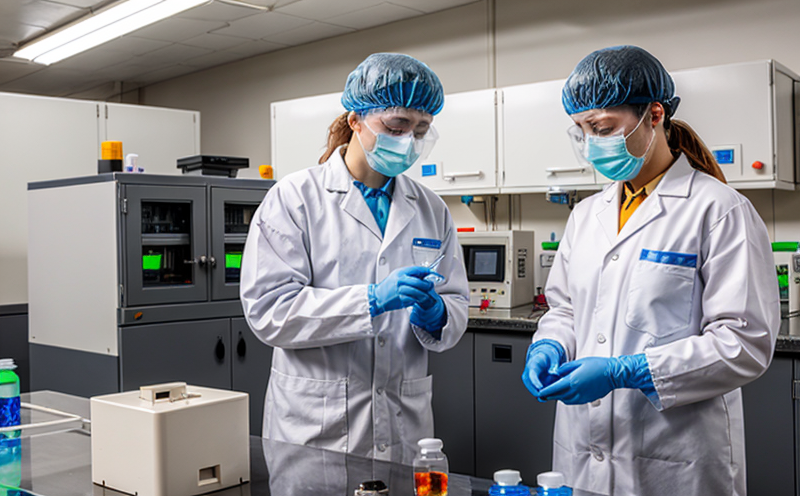ISO 25138 Furan Quantification in Canned Foods
The quantification of furan in canned foods is crucial for ensuring food safety and quality. This service focuses on the analysis of furans, specifically those that may be formed during the canning process or introduced through packaging materials. Compliance with ISO 25138 ensures that canned products meet international standards for safety and are free from harmful contaminants.
Furan is a volatile organic compound that forms as a byproduct in certain food processing methods, especially during high-temperature sterilization. Excessive levels of furan can pose health risks to consumers, particularly if ingested over prolonged periods. This service helps manufacturers identify and quantify the presence of furans in their canned products, enabling them to take corrective actions where necessary.
The testing process involves several critical steps:
- Sample preparation: The canned foods are carefully selected and prepared according to ISO 25138 guidelines. This includes ensuring the sample is representative of the batch it represents.
- Extraction: Samples undergo an extraction procedure that isolates furans for further analysis. Common solvents include ethyl acetate or dichloromethane, depending on the specific requirements and standards.
- Analytical instrumentation: The isolated samples are analyzed using gas chromatography-mass spectrometry (GC-MS) to accurately identify and quantify furan compounds.
The results of this analysis provide detailed information about the levels of furans present in the canned products. This data is essential for quality control, ensuring that each batch meets safety standards set by regulatory bodies like the European Union and other international organizations.
Compliance with ISO 25138 not only protects consumer health but also enhances brand reputation and market trust. By adhering to these stringent testing protocols, food manufacturers can ensure their products are safe for consumption and meet global safety standards.
Environmental and Sustainability Contributions
The quantification of furans in canned foods plays a significant role in promoting environmental sustainability. By identifying and reducing the levels of furan formation, manufacturers can minimize their environmental impact. This service supports the broader effort to reduce volatile organic compound emissions during food processing.
Reducing furan levels also contributes to waste management strategies by ensuring that only safe products reach consumers. This not only protects public health but also aligns with global sustainability goals. Compliance with ISO 25138 helps companies demonstrate their commitment to environmental stewardship, thereby enhancing their reputation and attracting environmentally conscious consumers.
Moreover, the use of advanced analytical techniques like GC-MS in this service allows for precise quantification, which can lead to more efficient production processes. By identifying areas where furan formation is higher than necessary, manufacturers can optimize their processing methods, reducing energy consumption and resource usage.
The results from this testing also inform packaging choices, potentially leading to the use of materials that minimize furan formation during storage. This comprehensive approach not only enhances product safety but also supports a more sustainable food supply chain.
Competitive Advantage and Market Impact
Compliance with ISO 25138 in the quantification of furans provides significant competitive advantages for food manufacturers. By ensuring that their canned products meet international safety standards, companies can enhance their market reputation and consumer trust.
The ability to demonstrate compliance with stringent testing protocols like ISO 25138 is a key differentiator in today's competitive global market. Consumers are increasingly concerned about the safety of the food they consume, and brands that prioritize safety are likely to attract more loyal customers. This service not only helps companies meet regulatory requirements but also positions them as leaders in food safety.
Furthermore, the precise quantification provided by this testing can lead to process improvements, reducing unnecessary furan formation and minimizing waste. These efficiency gains contribute to cost savings, which can be reinvested into product development or marketing efforts. This dual benefit of improved processes and enhanced market reputation provides a strong foundation for sustained growth and competitive success.
In the context of sustainability, compliance with ISO 25138 aligns companies with broader environmental goals. As more consumers seek out environmentally responsible products, this service helps manufacturers meet these expectations, thereby gaining a strategic advantage in the marketplace. The ability to demonstrate a commitment to reducing environmental impact can significantly enhance brand loyalty and attract new customers.
Use Cases and Application Examples
| Use Case/Application | Description |
|---|---|
| Quality Control in Canning Plants | Ensure compliance with ISO 25138 standards by quantifying furans before product release. |
| New Product Development | Evaluate the impact of different processing methods on furan formation during development stages. |
| Supply Chain Monitoring | Monitor furan levels across various suppliers to ensure consistent quality and safety standards. |
| Recall Prevention | Identify potential issues early, preventing recalls due to unsafe levels of furans in canned products. |
| Research and Development | Support R&D efforts by quantifying furans to understand their formation mechanisms better. |
| Consumer Confidence Building | Demonstrate commitment to food safety, enhancing consumer trust and loyalty. |
| Sustainability Reporting | Incorporate furan data into sustainability reports to showcase a commitment to environmental responsibility. |
The quantification of furans in canned foods is essential for maintaining high standards of food safety and quality. This service supports various applications, from ensuring compliance with international standards to enhancing product development and supply chain monitoring. By providing accurate and reliable data on furan levels, this testing contributes significantly to the overall safety and sustainability of canned products.





